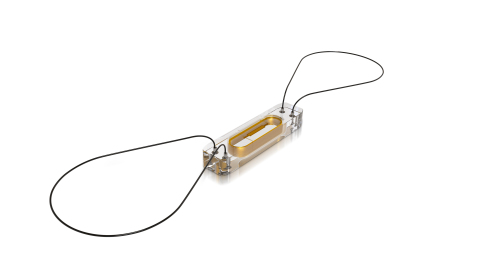A miniaturized heart-failure monitor recently acquired by St. Jude Medical (St. Paul, MN) from an Atlanta-based startup named CardioMEMS reduced 30-day hospital readmission rates for patients over 65, according to an analysis of the company’s Champion trial.
The study results, announced at the American Heart Association Scientific Sessions, showed that Medicare-eligible patients whose heart failure symptoms were tracked with the CardioMEMS HF system implant had a 58% reduction in general hospital readmissions, and a 78% drop in heart-failure-related readmissions, according to a company statement.

The CardioMEMS HF technology was recently acquired by St. Jude.
The dime-sized sensor is implanted in the pulmonary artery and wirelessly transmits artery pressure readings from patients’ homes to clinicians, who can then manage their treatment before visible symptoms occur. The findings may help not only patients’ health and pocketbooks, but also hospitals efforts to avoid government-imposed sanctions for Medicare patient readmissions within 30 days of discharge, it added.
CMS levied $227 million in fines on hospitals with excess 30-day readmissions for heart failure, heart attack, and pneumonia discharges in fiscal year 2014. The penalty list for 2015 will include chronic obstructive pulmonary disease, total hip and total knee replacement, sending projected penalties soaring to $428 million, the St. Jude statement said.
The FDA approved the CardioMEMS HF system in May, the same month that St. Jude announced it would acquire CardioMEMS for $375 million. The deal closed in June. St. Jude invested $60 million for 19% ownership of CardioMEMS in 2010, securing an exclusive option to buy the rest of the company later.
All of the computer industry's advances with microprocessing chips and mobile device technology, combined with less expensive surgery and hospitalization costs, are fueling medical device miniaturization. Medtech companies are betting that this tiny technology will be a more cost efficient treatment option than cardiac stents and cardiac rhythm management devices, which remain extremely expensive while leading to modest improvement in health for many patients. For instance, though stents can prove lifesaving for heart attack patients, their efficacy in elective procedures is debatable in many cases.
Preliminary results released in June from the first human implants of Medtronic’s miniaturized pacemaker, the Micra Transcatheter Pacing System (TPS), showed no major post-implant complications. The company is conducting a global clinical trial of the Micra that will enroll up to 780 patients at approximately 50 centers.
Comparable in size to a large vitamin and one-tenth the size of a conventional pacemaker, the Micra is delivered into the heart through a catheter inserted in the femoral vein, according to Fridley, MN–based Medtronic. Once positioned, the pacemaker is attached to the heart wall via small tines rather than leads, which have long been the Achilles' heel of pacemaker devices.




